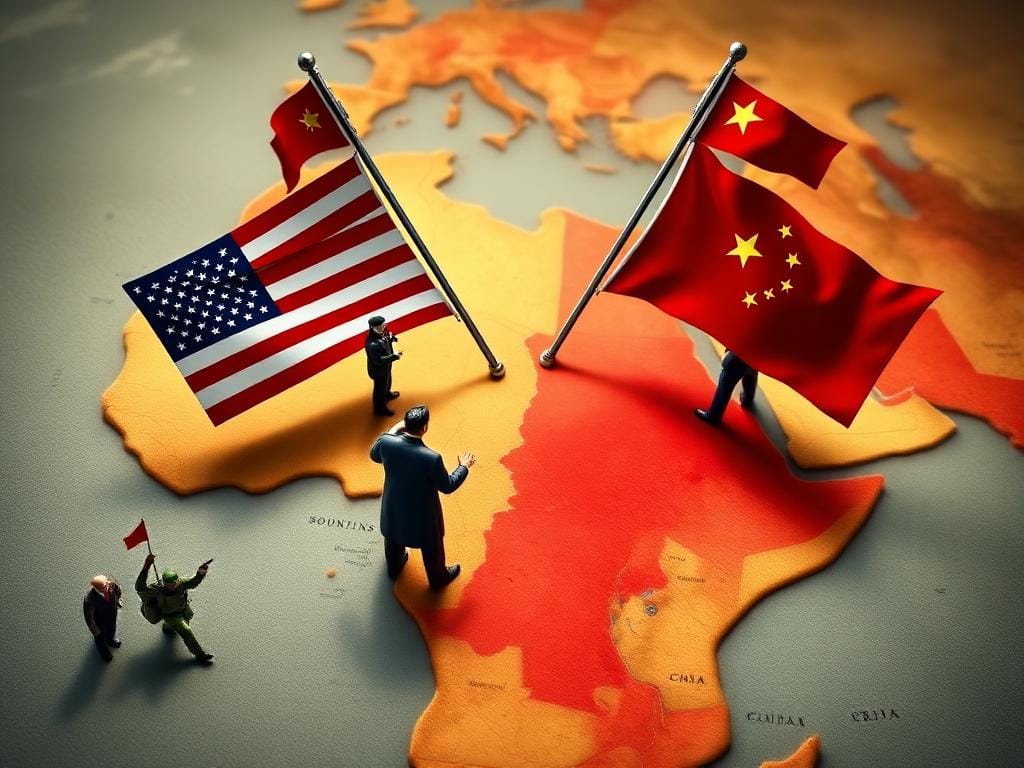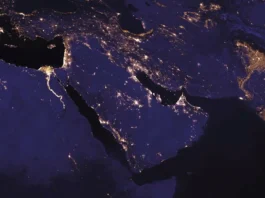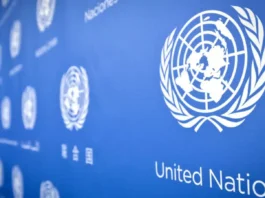Introduction
The geopolitical landscape of Africa is increasingly shaped by a growing power struggle between the United States and China. Both nations are vying for influence over the continent’s rich natural resources, strategic infrastructure, and economic partnerships. As the U.S. explores deals in countries like the Democratic Republic of Congo (DRC) to counterbalance China’s dominance, African nations find themselves in a complex balancing act between competing global powers.

This intensifying competition represents a modern scramble for Africa’s vast potential, with profound implications for the continent’s development trajectory and sovereignty. While China has established a significant head start through its Belt and Road Initiative and resource for infrastructure model, the United States is now strategically re-engaging with African nations to secure critical minerals and counter Beijing’s expanding influence across the continent.
China’s Influence in Africa: A Decades-Long Strategy
China has been Africa’s largest trading partner since 2009, employing a resource for infrastructure model that allows African nations to exchange minerals for roads, railways, ports, and energy projects. This approach has solidified Beijing’s presence across the continent and created lasting economic dependencies that continue to shape African development priorities.
Key Aspects of China’s Engagement:
- Massive Infrastructure Investments: China’s Belt and Road Initiative (BRI) has channeled billions of dollars into major infrastructure projects across Africa, from the Standard Gauge Railway in Kenya to hydroelectric dams in Ethiopia and Angola. These projects address critical infrastructure gaps while creating long-term economic and political ties.
- Resource-for-Infrastructure Deals: Countries like Angola, Zambia, and the DRC have used this model to finance development projects without immediate cash outlays. In exchange for access to oil, copper, cobalt, and other strategic minerals, China provides turnkey infrastructure solutions that might otherwise remain unfunded.
- Strategic Partnerships Beyond Economics: China has established military and commercial footholds, such as its naval base in Djibouti, which serves both security and trade interests. These installations protect China’s growing investments while projecting power along critical maritime routes.
- Comprehensive Diplomatic Engagement: Through the Forum on China-Africa Cooperation (FOCAC) and high-level state visits, China has cultivated relationships with nearly every African government. This diplomatic offensive includes educational exchanges, cultural programs, and media partnerships that shape public perception.
The success of China’s approach lies in its “no-strings-attached” policy regarding internal governance, which contrasts sharply with Western conditions on democracy and human rights. This non-interference stance has resonated with many African leaders seeking development partners without political preconditions.
👉 China’s Economic Strategy in Africa
The Debt Dimension: Evaluating China’s “Debt-Trap Diplomacy”
Critics have accused China of practicing “debt-trap diplomacy” in Africa, deliberately extending excessive credit to extract economic or political concessions when countries cannot meet repayment obligations. While this narrative has gained traction in Western policy circles, the reality is more nuanced.
Several African nations have indeed accumulated significant debt through Chinese loans. By 2023, Angola, Ethiopia, Kenya, and Zambia all faced debt distress partially linked to Chinese infrastructure financing. The Hambantota Port in Sri Lanka which was transferred to Chinese control after loan defaults is often cited as a cautionary tale for African nations.
However, research from Johns Hopkins University’s China-Africa Research Initiative suggests that Chinese lenders have been willing to renegotiate terms rather than seize assets. Most Chinese loans to Africa are collateralized by commodity exports rather than infrastructure, complicating the debt-trap narrative. Nevertheless, the growing debt burden remains a legitimate concern for African economic sovereignty.
The U.S. Response: Seeking a Competitive Edge
The United States has recently ramped up efforts to counter China’s dominance in Africa. One key move is its exploratory talks with the DRC to secure access to minerals like cobalt, copper, and uranium crucial for renewable energy technologies and defense industries in an increasingly competitive global market.
U.S. Strategic Approaches:
- The Lobito Corridor Project: The U.S. is investing in a major transportation corridor connecting Angola, DRC, and Zambia to facilitate mineral exports and regional trade without relying on Chinese funding. This $2 billion initiative represents America’s largest infrastructure investment in Africa in decades.
- Partnerships for Transparent Development: The U.S. promotes governance-focused agreements through initiatives like Prosper Africa and the Build Back Better World (B3W) partnership. These programs emphasize transparency, environmental standards, and labor rights as differentiators from Chinese engagement.
- Mineral Diplomacy and Supply Chain Security: Washington aims to break China’s near-monopoly on critical minerals by sourcing them directly from African countries. The Inflation Reduction Act and CHIPS Act have accelerated U.S. efforts to secure supply chains for electric vehicle batteries, semiconductors, and renewable energy technologies.
- Security Cooperation and Counter-terrorism: The U.S. maintains military partnerships across the continent, with bases in Djibouti, Niger, and other strategic locations. These security relationships complement economic initiatives and provide leverage in regions where China’s influence is growing.
Despite these efforts, the U.S. faces significant challenges in competing with China’s established presence. American companies often hesitate to invest in politically unstable regions, and U.S. foreign assistance typically comes with governance conditions that some African leaders find restrictive compared to China’s approach.
👉 U.S. Talks with DRC on Mineral Access
Technology and Digital Infrastructure: The New Frontier
Beyond physical infrastructure and resource extraction, the U.S.-China rivalry increasingly extends to digital infrastructure and technology transfer. This “digital silk road” represents the next phase of strategic competition in Africa.
China’s telecommunications giants Huawei and ZTE have built approximately 70% of Africa’s 4G networks and are positioning themselves as preferred partners for 5G deployment. These companies offer competitive financing terms and integrated solutions that many African nations find attractive despite Western security concerns.
The United States has responded with the Digital Transformation with Africa initiative, which aims to expand reliable internet access, build digital skills, and strengthen digital governance. American tech companies like Google and Microsoft are also increasing investments in African data centers, startup ecosystems, and digital education.
This technological competition between the U.S.-China has significant implications for Africa’s digital sovereignty, data privacy standards, and future economic competitiveness in the global digital economy.
The African Perspective: U.S – China
While both China and the U.S. offer economic opportunities, African leaders must navigate their partnerships carefully to avoid dependence on a single global power. Many nations are pushing for mutually beneficial agreements that respect sovereignty and long-term development goals.
Key African Considerations:
- Debt Sustainability: Some African nations struggle with debt owed to China due to large infrastructure loans, prompting calls for greater scrutiny of financing terms and project viability. Countries like Ethiopia and Kenya have begun renegotiating terms to avoid fiscal crises.
- Diversified Partnerships: Countries like South Africa, Nigeria, and Rwanda are fostering trade and investment relationships with multiple global partners, including the European Union, Gulf states, Turkey, and India. This diversification strategy reduces dependence on either China or the United States.
- Value Addition and Local Content: African governments increasingly demand technology transfer, local employment, and domestic manufacturing components in foreign investment deals. The African Continental Free Trade Area (AfCFTA) aims to strengthen intra-African trade and reduce external dependencies.
- Agency in International Relations: The African Union and regional economic communities are asserting greater collective bargaining power in negotiations with global powers. This includes pushing back against being treated as passive recipients of foreign investment or as mere proxy battlegrounds in great power competition.
African civil society organizations and policy think tanks have also become more vocal about the need for transparency in international agreements. Public scrutiny of both Chinese and American deals has increased, with citizens demanding greater accountability regarding environmental impacts, labor practices, and benefit-sharing arrangements.
👉 The Impact of China’s Debt Strategy in Africa
Environmental Considerations in the Resource Race
The competition for Africa’s natural resources raises significant environmental concerns. Mining operations for cobalt in the DRC, oil extraction in the Niger Delta, and various infrastructure projects have caused environmental degradation, habitat destruction, and pollution.
Both China and the United States have faced criticism for prioritizing resource access over environmental protection. However, growing global emphasis on sustainable development and climate resilience is slowly changing investment patterns. The U.S. increasingly incorporates environmental standards into its development initiatives, while China has begun addressing sustainability concerns in its BRI projects following international criticism.
African governments are also strengthening environmental regulations and impact assessment requirements, though enforcement remains challenging due to capacity constraints and competing development priorities.
Future Trajectories: Cooperation or Continued Competition?
The U.S.-China rivalry in Africa shows no signs of abating, but there are potential areas for constructive engagement that could benefit African development:
- Trilateral Cooperation: Limited collaboration on specific development challenges like public health, climate adaptation, or food security could demonstrate good faith while addressing urgent African needs.
- Complementary Investments: The infrastructure gap in Africa remains enormous, with the African Development Bank estimating $130-170 billion in annual needs. This creates space for both Chinese and American investments without direct competition.
- African-Led Coordination: African institutions could take a more proactive role in coordinating external partnerships to maximize benefits and reduce negative aspects of great power competition.
However, as global tensions between Washington and Beijing intensify, the prospects for cooperation remain uncertain. African nations will likely continue navigating between these competing interests while pursuing their own development agendas.
Conclusion
The U.S.-China rivalry in Africa is reshaping the continent’s future in profound ways. While China’s long-standing economic engagement continues to grow through infrastructure development and resource acquisition, the U.S. is making strategic moves to regain influence through targeted investments, security partnerships, and diplomatic initiatives.

For African nations, the challenge is to harness these competing interests to drive sustainable development and economic independence. The most successful African states will be those that maintain agency in their international relationships, leverage competition to secure better terms, and gradually build domestic capacity to reduce external dependencies.
As this geopolitical competition evolves, the ultimate measure of success should be how effectively it contributes to Africa’s own development priorities rather than how it advances U.S. or Chinese strategic objectives on the global stage.
Frequently Asked Questions
How does China’s approach to engagement in Africa differ from the United States’?
China’s approach to Africa primarily focuses on infrastructure development through the Belt and Road Initiative, using a resource-for-infrastructure model with minimal political conditions. Chinese engagement emphasizes state-to-state relations, offers complete package deals (financing, construction, and sometimes operation), and follows a policy of non-interference in domestic affairs.
The United States, by contrast, emphasizes governance, transparency, and private sector investment. U.S. engagement typically includes conditions related to democracy, human rights, and market reforms. American initiatives like Prosper Africa focus on facilitating business connections rather than direct state financing of infrastructure projects. The U.S. also places greater emphasis on security cooperation and counter-terrorism partnerships across the continent.
These different approaches reflect broader foreign policy philosophies: China’s development-first model versus America’s governance-and-market-oriented approach. African nations often appreciate China’s rapid infrastructure delivery but value American technology transfer and private sector expertise.
Is China’s “debt-trap diplomacy” in Africa a real concern or Western propaganda?
The “debt-trap diplomacy” narrative contains elements of both legitimate concern and oversimplification. Research from institutions like Johns Hopkins University shows that Chinese lenders have generally been willing to renegotiate terms rather than seize assets when African countries face repayment difficulties. The widely cited example of Sri Lanka’s Hambantota Port has few direct parallels in Africa.
However, several African countries have accumulated unsustainable debt levels partly due to Chinese loans. Zambia’s 2020 default, Angola’s oil-backed loans, and Kenya’s Standard Gauge Railway financing have all created fiscal challenges. The lack of transparency in many Chinese loan agreements including confidentiality clauses and collateral requirements complicates public oversight and debt sustainability analysis.
Rather than a deliberate “trap,” the debt challenges often stem from project selection problems, overly optimistic revenue projections, and governance issues on both the lending and borrowing sides. African governments bear significant responsibility for ensuring that borrowed funds generate sufficient economic returns for repayment.
How are African nations maintaining sovereignty while engaging with both superpowers?
African nations are employing several strategies to maintain sovereignty amid U.S.-China competition:
- Diversification of partnerships: Many countries are deliberately cultivating relationships with multiple external powers, including the EU, India, Turkey, Gulf states, and Japan, to avoid overdependence on either China or the U.S.
- Strengthening regional coordination: The African Union and regional economic communities are developing common positions on external partnerships, increasing collective bargaining power.
- Prioritizing African Continental Free Trade Area (AfCFTA): By boosting intra-African trade and integration, countries aim to reduce external leverage and build more self-sufficient economies.
- Increasing local content requirements: More African governments now mandate technology transfer, local employment, and domestic manufacturing components in foreign investment deals.
- Strategic balancing: Countries like Ethiopia, Kenya, and Nigeria have become adept at leveraging competition between external powers to secure better terms, playing Chinese and American interests against each other when advantageous.
These approaches reflect growing confidence and strategic sophistication among African policymakers, who increasingly view external partnerships through the lens of national development priorities rather than ideological alignment.
What are the environmental impacts of the resource competition in Africa?
The competition for Africa’s natural resources has significant environmental consequences. Mining operations for cobalt, copper, and rare earth elements critical for renewable energy technologies and electronics have caused soil and water contamination in countries like the DRC and Zambia. Oil extraction in Nigeria’s Niger Delta and elsewhere has resulted in devastating pollution and habitat destruction.
Infrastructure projects linked to resource extraction, including roads, railways, and ports, often proceed without adequate environmental impact assessments. Deforestation, biodiversity loss, and community displacement are common consequences, particularly when projects are fast-tracked to secure competitive advantage.
Climate change adds another dimension, as Africa is highly vulnerable to its effects despite contributing minimally to global emissions. Both Chinese and American resource extraction activities increase carbon footprints, though recent initiatives from both countries have begun incorporating sustainability considerations.
African civil society organizations are increasingly demanding stronger environmental protections in resource contracts. Some countries, like Gabon and Rwanda, have positioned themselves as green growth leaders, requiring higher environmental standards from all foreign investors regardless of origin.
How might the U.S.-China rivalry in Africa evolve over the next decade?
The U.S.-China rivalry in Africa will likely intensify around several key areas over the next decade:
- Critical minerals and supply chains: Competition for cobalt, lithium, rare earths, and other minerals essential for clean energy and advanced technologies will grow as both powers pursue supply chain security and green transition goals.
- Digital infrastructure and technology: The battle for influence over Africa’s digital ecosystem including 5G networks, data centers, e-commerce platforms, and digital governance frameworks will become increasingly central.
- Security presence: Both powers may expand military cooperation, training programs, and potentially base access as security challenges persist across the Sahel, Horn of Africa, and other regions.
- Climate finance and green development: As climate adaptation becomes more urgent, competition to fund and implement climate-resilient infrastructure and renewable energy projects will increase.
- Multilateral influence: Both powers will compete for African support in international institutions like the UN, potentially offering incentives for alignment on global governance issues.
The most significant variable will be Africa’s own agency and coordination capacity. If African regional institutions strengthen and the AfCFTA implementation advances, the continent could better leverage external competition for developmental gains while minimizing negative aspects of great power rivalry.




